
The last week of the year will set the pace for politics in the next year

As we approach the end of 2018, all eyes are set on the fate of two important political figures of the country -- former Prime Minister Nawaz Sharif and former President Asif Ali Zardari.
On December 24, National Accountability Bureau (NAB) court in Islamabad will announce the verdict on two remaining assets-beyond-means references against Sharif, and, the same day, the Supreme Court (SC) is scheduled to give further directions to the government on the findings of a Joint Investigation Team (JIT) report that may implicate Zardari and his sister Faryal Talpur in a money-laundering scam.
Chances are high that the two leaders of the main opposition parties Pakistan Muslim League Nawaz (PML-N) and Pakistan Peoples’ Party (PPP), could face jail, again. The activists of the two parties are bracing for mass protests in support of their leaders.
Sharif remained in jail for 65 days after he was sentenced in earlier reference for illegally owning London’s Avenfield Apartments on July 6, 2018 and got relief from Islamabad High Court on September 19, 2018. His younger brother Shahbaz Sharif, who is the opposition leader in National Assembly, is also in NAB’s custody for almost two months and a reference of corruption is likely to be filed against him in the next couple of weeks.
Separately, the JIT probing into fake accounts and money laundering in Sindh submitted its report in the SC last week after interrogating nearly 100 people, including PPP Co-Chairman Asif Zardari and his sister. His son Bilawal Bhutto Zardari, who leads the party, was also summoned but he did not appear before the team. He submitted his reply through his lawyers.
Things do not seem to stop here, as Federal Information Minister Fawad Chaudhry last week announced to move a disqualification reference in the Election Commission of Pakistan (ECP) against PPP Co-Chairperson Zardari, who is an elected member of the National Assembly, for concealing his assets in the US. He alleged Zardari owns an apartment in the US which is not mentioned in its asset statement submitted before the ECP. Therefore, the PTI minister maintains, he is liable to be disqualified under Articles 62, 63 of the Constitution.
Both parties, in their separate party meetings, have decided to start a nationwide agitation if their leaders are arrested, indicting further political challenges to the PTI government that is already having a tough time in running the National Assembly affairs. However, analysts think, they will fail to make a strong political mark outside the assembly.
"Three things are likely to happen in the event of opposition leaders’ arrest; one, there will be street protests bringing the PPP and PML-N close; two, there will be more protests in Sindh where the PPP rules as compared to Punjab where Sharifs will try to mobilise their workers at constituency level; and three, other opposition parties may join these protests to boost the campaign. But all this will be symbolic and won’t last long," observes political scientist Dr Rasul Bakhsh Rais.
"The PTI government is new and people might give it some time to test," he adds.
Journalist and political commentator Murtaza Solangi sees no political instability in the country even in the "worst-case scenario", where opposition leaders -- Zardari and Sharif brothers -- are jailed. "These parties would duck and cover to fight on another day. There will be less political loss to the PTI government -- until other important variables -- economic crunch and geo-strategic situation of the country -- start to worsen," he says.
He draws parallels between the present situation and the Musharraf era, when leaders of these two major parties were forced into exile, as a result "political depression kept increasing, eventually demolishing Musharraf’s rule in 2008".
In a separate development, finally, after a month-long delay, the government and the opposition agreed to a formula to set up the much-awaited standing committees. But, it seems, this will not help the treasury benches much in the smooth sailing on the floor of the house. In these past five months, the PTI government has failed to initiate any legislation or a healthy debate in the house.
"We want healthy debate but the opposition parties mar the assembly proceedings by protesting against the corruption references," Fawad Chaudhry told the media recently.
Clearly, in the next few weeks, the assembly sessions are likely to be marred by protest and the government’s shallow performance, raising questions about the capability of the treasury benches to cope with the situation and come out of the political blame games.